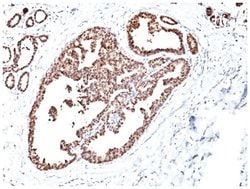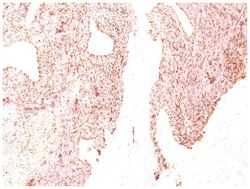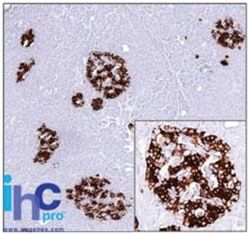HSP60 Mouse, Clone: LK1, Novus Biologicals™
Manufacturer: Fischer Scientific
Select a Size
| Pack Size | SKU | Availability | Price |
|---|---|---|---|
| Each of 1 | NBP232973A-Each-of-1 | In Stock | ₹ 47,882.00 |
NBP232973A - Each of 1
In Stock
Quantity
1
Base Price: ₹ 47,882.00
GST (18%): ₹ 8,618.76
Total Price: ₹ 56,500.76
Antigen
HSP60
Classification
Monoclonal
Conjugate
Unconjugated
Formulation
PBS with 0.05% BSA. with 0.05% Sodium Azide
Gene Alias
60 kDa chaperonin, Chaperonin 60, CPN60, GROEL, heat shock 60kD protein 1 (chaperonin), heat shock 60kDa protein 1 (chaperonin), Heat shock protein 60, heat shock protein 65, HLD4, Hsp60, HSP-60, HSP60SPG13, HSP65, HuCHA60, Mitochondrial matrix protein P1,60 kDa heat shock protein, mitochondrial, P60 lymphocyte protein, short heat shock protein 60 Hsp60s1, spastic paraplegia 13 (autosomal dominant)
Host Species
Mouse
Molecular Weight of Antigen
60 kDa
Quantity
0.1 mg
Research Discipline
Apoptosis, Cellular Markers, Membrane Trafficking and Chaperones, Mitochondrial Markers
Gene ID (Entrez)
3329
Target Species
Human, Mouse, Rat, Porcine, Bovine, Canine, Chicken, Drosophila, Hamster, Primate, Rabbit, Sheep, Xenopus species
Form
Purified
Applications
Western Blot, Flow Cytometry, Immunocytochemistry, Immunofluorescence, Immunoprecipitation
Clone
LK1
Dilution
Western Blot 0.25-0.5ug/ml, Simple Western 10 ug/ml, Flow Cytometry 0.5-1ug/million cells, Immunocytochemistry/Immunofluorescence 0.5-1ug/ml, Immunoprecipitation 0.5-1ug/500ug protein lysate, Immunohistochemistry-Paraffin 0.5-1.0ug/ml, Immunohistochemistry-Frozen 0.5-1.0ug/ml, SDS-Page
Gene Accession No.
P10809
Gene Symbols
HSPD1
Immunogen
Recombinant human HSP60 protein
Purification Method
Protein A purified
Regulatory Status
RUO
Primary or Secondary
Primary
Test Specificity
Recognizes a 60kDa protein, identified as the heat shock protein 60 (hsp60). Its epitope is localized between aa 383-447 of human hsp60. A wide variety of environmental and pathophysiological stressful conditions trigger the synthesis of a family of proteins known as heat shock proteins (hsps), more appropriately called as stress response proteins (srps). hsp60 is a potential antigen in a number of autoimmune diseases. In human arthritis and in experimentally induced arthritis in animals, disease development coincides with the development of immune reactivity directed against not only bacterial hsp60, but also against its mammalian homolog. Clone LK1, unlike LK2, recognizes only the mammalian (not bacterial) hsp60 and is useful in distinguishing hsp60 from mammals and bacteria.
Content And Storage
Store at 4C.
Isotype
IgG1 κ
Description
- HSP60 Monoclonal specifically detects HSP60 in Human, Mouse, Rat, Porcine, Bovine, Canine, Chicken, Drosophila, Hamster, Monkey, Rabbit, Sheep, Xenopus samples
- It is validated for Western Blot, Simple Western, Flow Cytometry, Immunohistochemistry, Immunocytochemistry/Immunofluorescence, Immunohistochemistry-Paraffin.




